How Director Joe Marcantonio Captured the Thrilling Complexities of 'Kindred'
We interview Kindred director Joe Marcantonio.

Head's up (and listen to this): If you ever find you have become a character in a film, and Fiona Shaw is playing another character in the film, and suddenly you find that Fiona Shaw is being really, really nice to you—really concerned about your well-being, when before she wasn't very nice—there is only one proper response.
Run.
Charlotte (Tamara Lawrance) does this several times during the tension-filled length of the new horror film Kindred, but her running doesn't quite turn out the way she planned.
Let's back up.
Charlotte is pregnant, and her boyfriend Ben (Edward Holcroft, in a brief but memorable appearance) has just died in an extremely sudden, violent, unfortunate, and ironic way. This leaves Charlotte more or less at the mercy of Ben's exceedingly wealthy mother Margaret (Fiona Shaw) and stepbrother Thomas (Jack Lowden), in a vast house that could best be described as witheringly and convincingly creepy.
Everything about it is creepy. The faint pastel furnishings are creepy. Its echoes are creepy. Its emptiness is creepy (you can feel the drafts blowing in at you). Even the driveway is creepy. And its occupants are no great shakes, either. Margaret is a woman of extremes who usually tilts toward menace, as only Shaw can do; Thomas frequently offers his guests quiche, a palpably awkward move which itself seems rather creepy. He's a man who seems to have simultaneously nothing and everything up his sleeve.
In other words, they're the perfect caregivers for a woman who has just lost her baby's father. Margaret wants an heir, and so Charlotte's health and well-being are extremely important to her—so important that she blocks Charlotte's comings and goings every chance she gets. Kindred is a truly frightening story about loss and the evils old money can bring.
No Film School had a wonderful conversation with first-time director Joe Marcantonio about the complexities of making the film.
No Film School: How did you find the amazing house the movie takes place in?
Joe Marcantonio: The reality is we knew what kind of house we needed. And it was just a case of finding the right kind. And the script was originally set in Scotland. I am based in London, and most of the actors are based in London. We were like, well, we'll see if we can find one in England.
So we started off looking in England. But then the problem with England is you don't get a big tax break for shooting in England because they usually want a tax release. Then we went to look at Scotland, but again, I didn't qualify because I'm English rather than Scottish. Although my producers are Scottish, we didn't qualify for the right kind of bursaries. Then our attention turned to Ireland because there's a very nice tax rebate for shooting in Ireland.
And also, location-wise, it's got the right feel because—basically this is where it becomes a bit of a crazy story—because of the British occupation of Ireland. A lot of these kinds of British manor houses were built in Ireland just before the potato famine. And then after Irish independence, a lot of them were burnt down and destroyed. And then the ones that weren't tended to have fallen into a state of disrepair.
So we went to Ireland and looked around Dublin for a week or two. And then again, there's a thing in Ireland where if you shoot a certain distance out of Dublin, because they're quite a unionized film crew, shooting outside of Dublin is a bit of a pain because you have to overnight all your crew and pay extra for transport and load. There are all these associated costs with shooting throughout Dublin. And this house was just too far out of Dublin. That meant shooting here would be a big headache for production. But luckily, because the house was so good, they let me do it.
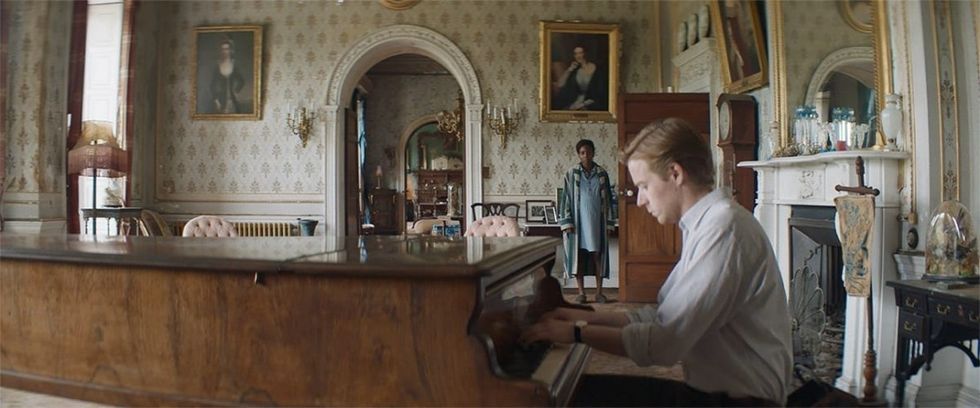
NFS: Was there any sort of acclimation period before you started shooting? Did you have a period where you're just sort of helping people get used to the space?
Marcantonio: It was my first film, but I've been working in the industry for 15-plus years, doing various funny little jobs here and there. And one thing that I've kind of gathered together is how important rehearsal is. And not just rehearsal, standing in the room, just doing the lines and kind of blocking it out and working on the scripts. Basically, I managed to scrape a two-week rehearsal period, which is quite rare for a film this size, this small. We spent about a week and a bit in London refining the script. And then when we went to rehearse on location, we just spent a lot of time exploring the spaces and going around rooms and investigating and working out whose bedroom was whose.
And even the rooms that you don't see in the film we designated in the house. We said, "Oh, this room would be Thomas' room. And this is the room that he threw his stuff in. And that way you kind of help it become part of the character in the film. And that's something you don't get that if you shoot on a soundstage. Because on a soundstage, you have to design everything from where the ashtray sits to what kind of flooring you've got. You don't get the happy accident you find in the location itself. So that was a handy thing.
NFS: Well, let's back up a little bit. I'm curious how the story itself evolved and what the germ was for that. And how long it took to develop the script. And just what the origin of the whole idea for the movie was, because it's very compelling.
Marcantonio: Basically, I am currently 39 human years old and I think I've been writing off and on since I was about 14, or something.
That was when I wrote my first alien invasion script. Which luckily, I don't know where it is, because I imagine it's absolutely awful. And over the years, I did go to a film school. It wasn't a particularly prestigious one. It was more like a university with a film course in it. And then I graduated and was a runner for years. And all throughout this whole period of being an assistant and trying to shoot music videos and then corporate ads and all this kind of stuff, the one thing that kept me sane throughout all of this kind of slog of a career was writing scripts and trying to get scripts made. And I don't know anyone. I haven't got any family members in the film industry. I grew up in London, so it's not like it's alien to me, the industry itself.
But all my experience was more commercials and that side of things. That's where I kind of made my break assisting and working in offices and stuff. What kept me going was I wanted to make movies, and the only way I could think to do that was to write scripts. So I've been writing for a long time and constantly writing ideas down. And this idea came to me, about 10 years ago, and I just wrote it down with all my other ideas in my folder. I've got a folder on my computer with little Word documents with anything from a one-line synopsis to a page of random garbled notes. And I basically wrote down the sentence about how the family kidnapped their daughter-in-law after their son died because they didn't want her to run off with the baby.
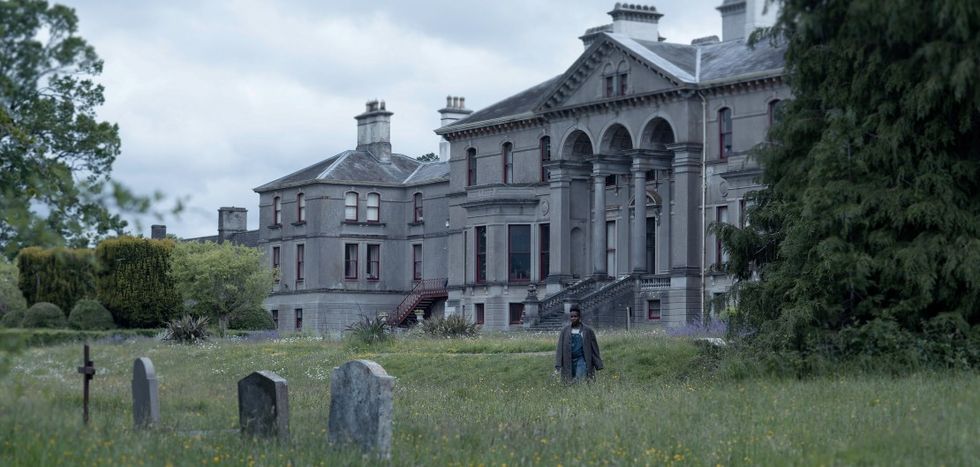
And I don't really know where it came from. There's a famous case in Europe, the Josef Fritzl case. He was this horrible Austrian dude who kept this girl locked in his basement for years and years. But I think it must've been basically off the back of that. It wasn't directly inspired by it, but I seem to think, looking back, it must have been kind of about the same period. And I just left it in my folder because it just seemed like a kind of slightly mean-spirited idea. I'm not really one for grotesque, torture porny, grizzly stuff unless it has a reason to be there. The idea just sat in my folder for 10 years.
And then to go along with some of the writing I was doing, I started directing short films, self-funded short films. And they started off being little 200-buck kind of independent bits and pieces. What would you call them? Like a fiction, kind of. Really low-budget set in one room, silly projects with friends. And then I started shooting documentaries because they're cheap. I could do a documentary for a couple hundred bucks. And I had a few in a row that got Vimeo staff picks. And then I got lucky and I met this producer at a pre-natal baby class. We were having kids at the same time, and I just randomly met this guy who's a film producer.
And so we decided to do a short film together, called Red Light. You can see it on my website, and it's out on video. And then that, I finished that short, which I wrote. And then the producer was like, "Okay, well let's do a feature. What have you got?" And I went through all the scripts that I've written. And at this point, I probably had eight features written, eight or nine. And say the first seven were terrible. And then the last two were actually not bad. They were pretty good. They were good enough to show people and not feel embarrassed. But the problem is they were my first-time movies. They were overly ambitious, had a bit of violence, or the cast was too big. They were kind of very rambling, big kind of things.
We were like, "Okay, let's write something new. Let's open the ideas folder and see what we can come up with." And so I kind of sat here with my ideas folder. And then this idea that I'd come up with 10 years before just randomly jumped out at me, I think because I was a parent and I had another kid on the way, so my wife was pregnant. And I shifted from seeing it from the family's point of view to seeing it from the girl's point of view.
The synopsis stayed the same, but my approach to the synopsis had changed.
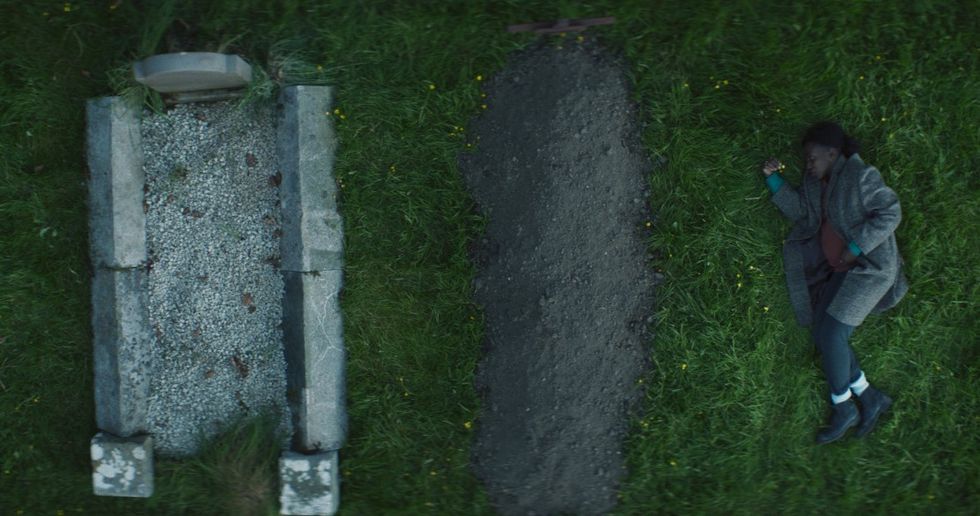
NFS: I'm wondering, when you were shooting the film, when you were in process, did the script shift? Did it change, or did you adjust it?
Marcantonio: The biggest shift we had was in that rehearsal period. Part of the reason I do that is because I want the actors to do something like what they do with theater, basically, where you work off a script. What we did was I'd go through the scripts and I'd write down, after every single line of dialogue, or every word of the dialogue, what that line actually meant, what that person actually wanted. And then for each scene, I'd write down what the scene was really about and what the needs were and what the journey was. So I had quite a detailed idea about every aspect of the film.
Then when we came to do that rehearsal period, I'd go through that with the cast and be like, "Look, this is my ambition. And this is what I'm trying to say. What do you guys think?" And it would help because they'd be able to say, "Oh, I don't think I need to say this line of dialogue. I can do that with a look." Or, "I think this line, if you're trying to say that I'm not happy he's leaving, maybe rather than just say I'm not happy he's leaving, I could ask for a new glass of water," or whatever it is. You come up with alternatives. And that process doesn't change the film in that the end results have changed—the scene starts and ends as it would've done before. But what it does is give the cast the opportunity to imprint themselves on the characters. It makes the performances stronger because they're not pretending and just repeating the words that I've written. They're kind of actually living the part because they are part of the creation of the character.
All of what I was describing there was before we shot. That was all before. What I'd do is I'd sit with my co-writer, Jason, and we would write down everything that we came up with. And then if anything was good, we'd keep it. And if it wasn't, you wouldn't. And then that night we'd go home and we'd write it up. And the next day we'd come in with new scripts for everyone. And then we'd do the whole thing again, and we did that for eight days. And it was quite laborious; it's not easy. It's kind of fun in a silly way, but it's also quite a slog. But it worked, I think, because that is where the performances come from.
Whereas when we were actually shooting, because we'd been through that process and a lot had changed on set, we lost a couple of things in the edit. One didn't work tonally. And the other one worked really well in the script, where Charlotte gets dizzy and almost falls down the stairs. But when you got into the edit, you realize that she's basically walking down the stairs and the lower she gets on the stairs, the less peril there is that she's going to hurt herself. So it was just like, oh no, wait, actually, because it was the other way around. You're supposed to be walking up the stairs. But you don't really even realize.
NFS: All the characters in the film have something very intense going on beneath the surface. Did the actors do a lot of work developing backstories for their characters? Did you talk about that with them a lot?
Marcantonio: Part of my writing process is that I write quite a detailed backstory for each of the people in the film, everyone from the gardener to Charlotte and everyone else. And I did share that with the actors. And then in my early one-on-one meetings with them, I'll go through it and I'll explain who I think their character is and where they're from.
But again, I'm not dictating to them what the case is because they'll have read the script to this point and they'll have their own thoughts. And we'll kind of work on something together, but I'll essentially leave the finer points up to them. Because at that point I'm kind of handing a character over, if you know what I mean. Famously, Billy Wilder used to stop Jack Lemmon mid-sentence during a take and say, "You forgot to put the comma in," or "You didn't pause long enough after you said the sentence." Whereas that's kind of the opposite of what I do.
I like to let the actors have a little bit more free rein than that. And if it doesn't quite do what you want you do another take afterward, or you chat with them about it and try to be open and honest with them. Because for me, it's about authenticity. I don't want the actors to be pretending, I want them to be experiencing and trying to get that balance between the authentic experience and serving the story.
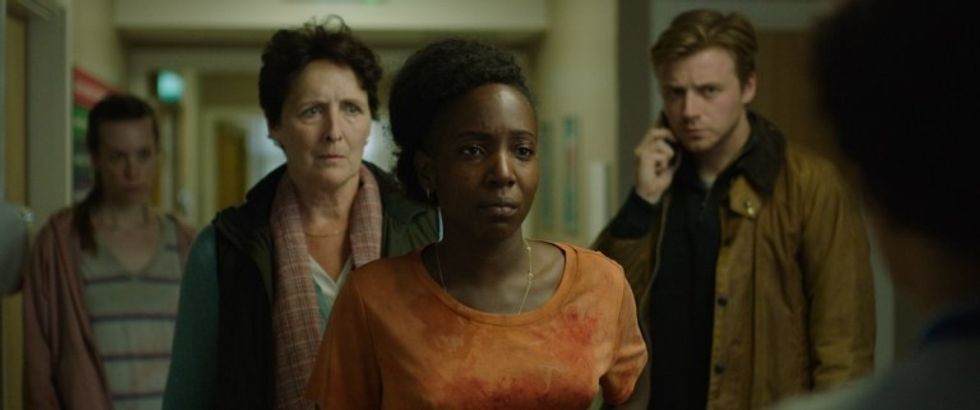
NFS: Fiona Shaw's and Tamara Lawrance's characters more or less dominated the movie. There was obviously a lot of tension between their characters both in the mother-in-law/fiance relationship, but also because they're both parents—one who's actually had a child, one who has not. And I'm wondering, when you were working with the two of them, how did you develop that relationship?
Marcantonio: I think the funny thing is that it is a constantly evolving piece. It kind of depends on what you're filming in a way. And if you're filming a scene that is going to be a tense scene, the actors will naturally kind of maybe avoid each other a little bit more than they would do ordinarily. And equally, if it's a scene that's a bit more jovial, they'll be kind of hanging around set chatting to each other a bit more.
Again, I think that process we went through in production helps because no one on the day of shooting is nervous about what they're doing, or what their motivations are, or about what's going to happen because everyone has a certain level of experience.
And I think that they are both from RADA, which is a very, very famous acting school in London. Fiona went there many years ago and then became a member of the RSC, or the Royal Shakespeare Company. She is literally one of the greatest actresses of her generation. And Tamara, although she is a younger actress, happened to come up through theater, and I think that they can kind of turn it on and off a bit more than non-actors and less experienced people. The people who work in a more in-the-moment kind of style probably find it a bit more tricky. But I think it's just down to the personalities of actors and how much preparation you've put in.
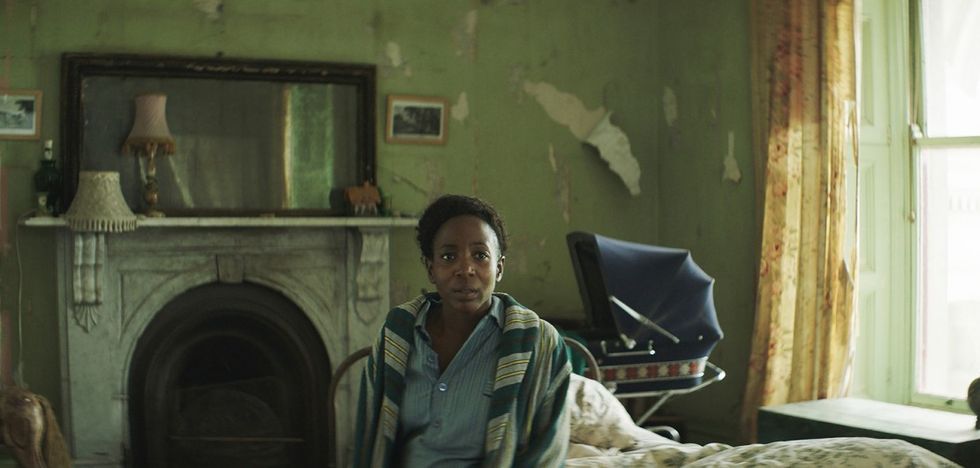
NFS: The bird imagery in the film was very strong. What were your goals with it when you were writing?
Marcantonio: The idea is basically one of perspective. Films are almost always from a single character's point of view. And what I was keen to do at the start of the film was to try and make the film almost from a couple's point of view. Charlotte's the main character from the very get-go, don't get me wrong. But I wanted Ben, her partner, to be an equal almost in that opening part to the film. So that then at the end of act one, when tragedy strikes, it's a bit more impactful for the audience. And so you don't see an awful lot of bird imagery, only a few flashes in the first act. And it's really from that point on that it becomes a bit more obvious and a bit more, kind of recognizable. And that's because it's supposed to signify that shifted perspective. Now we are seeing everything through Charlotte's eyes.
And equally, the crow family of birds, they're used in literature and art as harbingers of dark omens and murder, and death, and looming darkness. That's kind of why we chose that imagery. And it shifts slightly in the film from being very close up and more abstract at the beginning, then faster and more erratic as the film goes on. They kind of reflect her mental state in the film.
NFS: How did you manage the logistics of animal handling on set?
Marcantonio: I've got to tell you, it was a very strange experience. I've shot with some animals before. One of the weird jobs I've done over the years was a bunch of commercials for a famous department store in the UK called John Lewis. And we had to shoot a badger, and a squirrel, and a hedgehog, and a fox, and a bunch of stuff. That tended to be very long zoom lens stuff. But the problem is with this film aesthetically, I didn't want that look. It had to be prime lenses. It had to be anamorphic.
That was slightly tricky. Because as I mentioned, you would be much closer to the animals. And also we're shooting in rural Ireland. Tracking down the right amount of birds we needed was not the easiest thing. And then there are all the discussions about how much we could do with VFX and how much we should shoot for real. We ended up shooting a bunch of stuff on green screen. We set up one in the front room, the sitting room, and shot a couple of things, thinking we'd never use it. And actually, a couple of those shots did make it into the film. And the rest of it was shot in a hay barn because we couldn't afford a proper studio; everything we shot had to be in or around the house.
We found an abandoned hay barn, decked it out, put some straw on the floor, and then shot the birds first. And then we brought the horses in, and shot the horses. The trickiest thing with the birds is we shot a giant raven, and then some smaller crows, and some magpies. The crow and the raven worked out pretty well, but the only magpies we could get from the animal handler were very weird-looking. There was one that was kind of like a hatchling and one that was fully sized. It had broken its leg on Game of Thrones so it had this really weird, sticking-out leg. So we didn't use the magpies, in the end.
As I've told you, anything with the animals is incredibly stressful because it just takes so long.
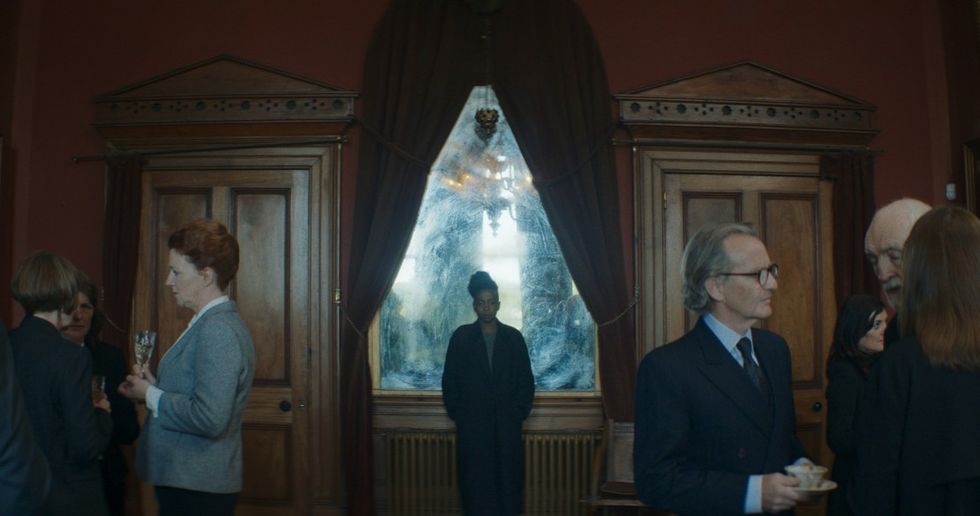
NFS: How much would you say you shot versus the amount you kept?
Marcantonio: We probably shot half a day, so I don't know how many hours of rushes that probably was. It was probably about two hours' worth of physical filming rushes, but then most of it was at 50 frames. So we probably had about three and three and a half hours for about 30 seconds worth, 40 seconds worth in the film. It's tricky. I'm a big planner. I showed people their shot list every day and I kind of knew what I wanted. And then I'd always end up changing things on the day because you want to have time or you see a different option when you're there. But for that stuff, I think we kind of stuck to getting what we needed, because you don't want to be stuck in the edit realizing that you didn't get that one shot you needed.
NFS: Obviously the soundtrack does a lot to heighten tension. I'm just curious how you arrived at it.
Marcantonio: From day one of planning the script, the score was going to be a big part of it for me. I tend to find film scores do one of two things. They either distract, or they enhance. And I was keen for it to be the kind of film score that enhances the film and enhances the mood. I basically made a folder of records on Spotify and then we approached a few composers. And actually, Natalie, who's our co-composer, went to a kind of very prestigious film school in the UK with my editor of the film, Fiona. They knew each other. Natalie’s incredibly talented and got the vibe of the film straight away.
And she basically went home and, I think within a day, sent me exactly what I wanted. She drafted in a guy called Jack Helena to help her to do it with her. And that worked out really well, as well, because he's more about programming and more modern layering of sounds. She was more about traditional strings and conducting, almost. And for a film our size, we didn't have a lot of money, but we even managed to get some live recordings in a proper recording studio. We had a 14-piece orchestra. They went above and beyond to try to get it to work, and I think they did a really good job.
Kindred is available to rent or buy on iTunes, Google Play, and other streaming services.











